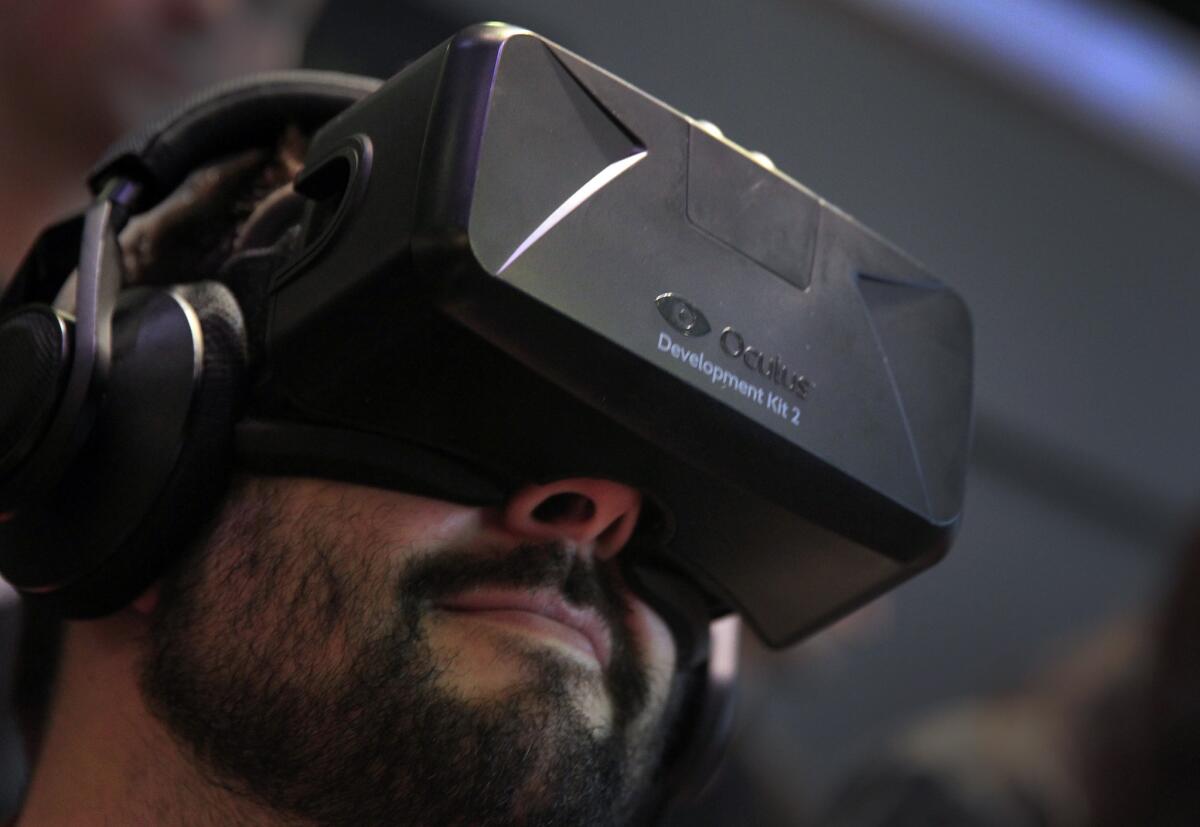VR Watch: Hollywood players Disney and CAA to invest in Virtual Reality powerhouse Jaunt

Jaunt’s content is meant to work on all platforms, including headsets such as the upcoming Oculus Rift, seen here at the E3 trade show at the Los Angeles Convention Center on June 10, 2014.
- Share via
One of the big questions for virtual reality as it moves into the mainstream is just how much it can define, and be defined by, the world of entertainment.
The idea of watching a movie or TV-style story plunged in the immersiveness of VR is deeply appealing. But Silicon Valley and Hollywood have, to put it mildly, a famously guarded relationship, each side wary the other doesn’t understand its business. Scripted VR is also a pretty thorough revamping of how Hollywood tells stories.
On Monday morning, at least, those arguing for a fruitful partnership could put a mark in the check column. Disney and CAA, quintessential entertainment-industry insiders, committed to investing in the Series C round of funding for the VR powerhouse Jaunt.
In an announcement, Jaunt said the round has raised $65 million--primarily from Disney, Evolution Media Partners (which is the shared effort of several companies, including CAA-backed Evolution Media Capital and Hollywood conscience Participant Media) and the Chinese firm China Media Capital, the last of which begins to push VR frontiers into Asia, which has not yet had the same enthusiasm for the medium as the U.S. Secondary investors include Madison Square Garden and German media firms ProSieben and Axel Springer.
SIGN UP for the free California Inc. business newsletter >>
The funding--which comes on the heels of about $40 million in two previous rounds and makes Jaunt the best-funded VR startup out there--will enable the company to reach the goal of “scaling up production of VR,” as CEO and co-founder Jens Christensen said in an interview with The Times. He said expanding the company’s Hollywood-focused Santa Monica offices and generally increasing the quality and quantity of VR content is on the docket with the new money.
If you’re not familiar with Jaunt, it is one of the more intriguing companies in the realm of VR. It began by working on cameras and software--wonky stuff--but in the past year or so has begun moving in a different direction, looking to be a more forward-facing distributor of “cinematic VR”--essentially high-end VR content that isn’t video games. Back in the spring, it recruited some LucasFilms vets and started a studio.
The Disney and CAA investment is notable in this light. Most of the previous Jaunt investors (with the exception of some early coin from BSkyB) have been of the inside-Silicon-Valley variety, Google Ventures and Highland Capital and the like. This round has the effect of putting Jaunt right in the Hollywood mainstream. It also exemplifies Hollywood companies’ interest in VR--and, potentially, paves the way for them to produce content for it.
“With this strategic round we have found on-board investors who can create these experiences,” Christensen told The Times. “It’s a great step in the right direction in terms of lining up high-end talent.”
Jaunt needs studios and filmmakers. The company can’t go at it solo, as Christensen acknowledged in the interview; building up a Pixar-like creative entity from scratch wouldn’t make sense on several levels. So having the trust from, and access to, filmmakers at Disney or CAA could go a long way.
“A lot of creative people are interested in VR but don’t know where to get started,” Christensen said. “The intention [for Jaunt] is to give people a base to explore ideas and, eventually, if they decide to produce content, to give them the ability and mechanism to do it.”
Tangible fruit from the investment may still be a ways off, if they arrive at all; plenty of investments, after all, end up being of the silent variety and amount to no actual collaboration. And it’s not the first investment of this kind--the financier and producer Thomas Tull has invested in VR pioneer Oculus, to take one example, and studios such as Fox and Sony have pushed forward with their own VR content.
But the idea is certainly to mesh the gears in the VR-Hollywood machinery. Dollars from Disney, even relatively few dollars by conglomerate standards, means the company will have more of an interest in making the medium take off. That could increase the odds for a VR Pixar short, a movie-marketing spin-off, a theme-park attraction or coverage of an ESPN live sporting event. (Something like a full-on “Star Wars” in VR, while attractive, is probably a galaxy far, far away----production budgets and viewer capacity to watch full features are obstacles too high at this point.)
Meanwhile, the investment from a CAA-backed firm could make it more likely a client of the agency takes a swing at the new medium.
“Brands, artists, and creatives are looking to reach and interact with their audiences in new innovative ways, and Jaunt’s expertise provides a groundbreaking medium for exploring these new avenues,” Rick Hess, founder and co-managing partner of Evolution Media Capital, said in a statement. “We look forward to working with Jaunt as they continue to pioneer in this space, giving them access to our wide-reaching network, and expanding on their distribution potential.”
Of course, there’s the possibility of it working too well, and thus alienating other companies; why would a Warner Bros. or Sony want to create content for Jaunt if doing so would benefit a direct competitor like Disney? Or, for that matter, why would a WME client? Christensen, for his part, said he hasn’t seen that resistance yet, and in any event it would be a high-class problem.
The Jaunt exec says that his company maintains its goal of focusing on three strands of content--live events such as concerts (they’ve already collaborated on a Paul McCartney show and hope the MSG money bolsters these efforts), journalism (as underscored by a recent link-up with ABC News) and narrative storytelling.
Their pitch to companies is that Jaunt can help make their content available for VR as well as deliver it to consumers in a kind of VR-themed distribution arrangement; Christensen compares it to an HBO or a Netflix, and says the company will undertake efforts to become the point of contact between consumers and the VR content they want to buy. (Jaunt’s content is meant to work on all platforms, including headsets such as the upcoming Oculus Rift and HTC Vive as well as mobile such as Samsung Gear VR and Google Cardboard.)
How soon consumers will be logging on and buying a Disney VR short from Jaunt is an open question, and there’s a good chance it never happens, at least not in that way. But those involved say a larger process has begun with the new partnership.
“I think it’s really a great validation and stamp of approval that is going to bring cinematic VR to the forefront,” said Christensen of the investment. “What started out as a medium of more experiential pieces where you place yourself on a mountaintop has moved to something that involves more storytelling. We look forward to doing a lot more of that.”
More to Read
Only good movies
Get the Indie Focus newsletter, Mark Olsen's weekly guide to the world of cinema.
You may occasionally receive promotional content from the Los Angeles Times.











